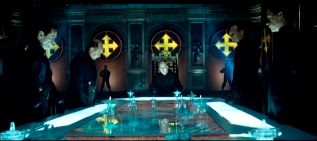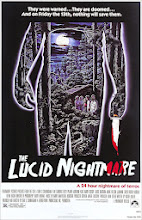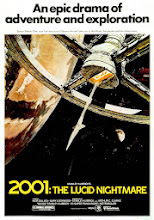Director: Fyodor Bondarchuk
Year 2008, 2009
The Inhabited Island is a sweeping and ambitious science fiction film based off of the writings of the legendary russian authors Arkadiy and Boris Strugatskiy. The film is set in the year 2157, following the exploits of a young earthling named Maksim who unexpectedly crash lands on an uncharted yet fully populated planet. Maksim, now a stranger in a strange land, must figure out how to survive in this hostile new world while simultaneously bringing about a revolution against an oppressive government that controls its citizens by use of an elaborate form of mind control.
 |
| Meet Maksim AKA Guy Smiley. |
 |
| Something's wrong with your horizon. |
The Inhabited Island is actually in two parts, but for the sake of this review and the overall flow that both films have with each other, I'm going to treat this as one long epic film. When watched back to back, both films combine to make a rather amazing film that satisfies my space-age hunger for breathtaking future landscapes and otherworldly cultures and societies. I really had a lot of fun with this one.
Based off of the Strugatskiy brothers novel, Obitaemyy ostrov, The Inhabited Island has a lot going for it. The world that they create on the written page is just sublime in its creativeness and it's brought beautifully to the screen by director Fyodor Bondarchuk. I'm sure the translation from page to film doesn't translate as precisely as rabid fans would have liked, but for myself having not read the novel, I was highly impressed and thoroughly entertained.
 |
| Not even Maksim could pull off this look. |
 |
| This planet sucks. |
The film stars Vasiliy Stepanov as Maxim Cammerer, also referred to as Maksim by the natives of the planet, and boy does this guy like to smile. Well maybe not the actor, but the character of Maksim has a shit eating grin throughout the majority of the film. I've read a lot of reviews and comments on how various people were put off by the grinning wonder boy and his pearly white chompers, but I wasn't that bothered by it.
In fact I actually thought it suited the character, because at the start of the film we are told through narration that the younger generation of Earthlings were brave, strong, and naive. With a combination like that, why wouldn't Maksim be a little arrogant towards danger and cocky to boot. For me the real interesting thing is how Stepanov was able to balance such conflicting and unlikable traits and allow his character to be the hero of the piece and someone we could be proud to root for. Maksim doesn't come off as a hot shot or know it all, but rather he displays the natural approach of an innocent child who's experiencing this strange world for the first time and being mostly amused by it. I can see how this could agitate the audience to a point, but I never felt encumbered by it.
 |
| Dark City with a dash of Blade Runner. Yes please! |
 |
| Rada raving it up! |
I think the reason that this approach worked for me is that it allowed a chance for the viewer to go along on Maksim's journey. In both aspects, we and Maksim are strangers to this world and the way things work within it. By making Maksim childlike and having him react to things the way he did, which in any other context would be laughable, establishes a connection with the main character and the audience allowing us to relate to him more then if he was just nonchalantly dealing with the culture shock as an everyday experience.
What makes this notion that much more complex and unorthodox is the fact that Maksim is more or less an enlightened being. Having come from an Earth that has made war, terrorism, illness, and hunger obsolete, the society that Maksim has been thrown into on this new planet is primitive in all aspects of comparison. Pitted in a very un-humbling situation, he doesn't use this opportunity to talk down to the inhabitants of the planet, but rather try to help them gain some truths to the situations that their society has kept from them. It's a noble attempt and in the end we aren't given a clear answer to if Maksim's actions were the right or wrong thing to do and I think the ambiguity in that conclusion is brilliant.
 |
| Did I mention that Maksim is quite the bad ass. |
 |
| There's always time for love. |
I don't know how action oriented the original novel is, but in the film Maksim is an undeniable juggernaut of pain, flinging bodies and breaking bones. The fight scenes were well crafted, peppered slightly with the modern stylistic tendencies that tend to crop up in science fiction films now a days. The film had that Matrix/Equilibrium edge, with the slow motion bullet time effect, but panned it down a bit in order to not come off as a cheap rip off. If anything, you could argue that it was too sleek of a presentation, but I felt that the brutality of the fights were savage enough to bring the choreography into its own.
The bone crunching hits and extreme emphasis on Maksim's territorial like attacks, brought about another side to his character that lay hidden prior to the mayhem. What I like most about the fight scenes, is that they only occurred when Maksim was defending himself or someone else. He was never the aggressor until provoked or effected by the soured elements of the society. Don't get me wrong, I'm no pacifist by any means, but I think it worked perfectly for Maksim's character. He comes from a world that has reached that higher level of existence and wouldn't generally go around being a bad ass just because he could. He has the means to wreck shop, but only does so in defense or honor of someone other then himself. All in all the fight scenes were extremely high paced and well thought out. Best of all they were used sparingly so not to overwhelm the story, adding only to emphasis his protective nature for the ones he cares about.
 |
| Wait for it... They're going to bust out the Thriller dance. |
 |
| So we're all in agreement... this room is bad ass. |
Of course what would a modern science fiction film be without the addition of love. It seems cliche and I know the purists of the genre could do without its inclusion, but I've always enjoyed the romance angles in science fiction movies. Be it the metaphorical overtones in both versions of Solaris or the painfully trite displays of affection in films like Tron Legacy and The Island, I love them all. In The Inhabited Island they go for the later, yet despite all its familiarity and unoriginal trappings it still seems relevant.
In Maksim's case, he meets a local by the name of Rada, played by a hauntingly quiet and subtly beautiful Yuliya Snigir. She introduces him into the world and helps him feel more at home, giving Maksim a reason to want to change things for the better in this broken society. We're given some rather nice and somber moments in the early half of the film, where they both get to know each other better while at the same time flushing out some of Rada's back story. One of my main fears was that the story would move so fast, in order to carry the film's enormous story load, that the characters would suffer as a result. Luckily my fears were laid to rest as we're given a great deal of quieter moments, where Maksim gets a chance to grow roots so to speak with every person that he comes across with.
 |
| Nothing like having sex on the sun. It's a scorcher! |
 |
| Damn it Maksim! You fell for the oldest trick in the book. |
This is another aspect of the film that really hits the mark. Maksim crosses paths with a great deal of diverse people on his twisting journey and each person pops in and out of the narrative as the film moves along, sometimes at the craziest moments and most opportune times. The closest movie that I can compare the film's reoccurring character formula with would be with the Star Wars films, originals, prequels, and the entire Star Wars universe in general. Even though Star Wars is legendary in my opinion and miles above The Inhabited Island in most every way, I feel that it was executed better in this film. Where Star Wars had an entire galaxy to pull characters from, Inhabited Island had one single planet, concentrating solely on a lone city and the surrounding territory.
With Star Wars you'd think we would have the most diverse cast of characters the world had ever seen, but instead we were given the same core players and their family members throughout a combination of six films, over and over again. It came to the point where the coincidences that Chewbacca had met Yoda in his earlier years or R2D2 had been palling around with Obi Wan long before the Empire was ruling the world, were beginning to spread the concept a little thin. Luckily in this film, we are only given a small area to spread our reach and having Maksim run into the same people a number of times felt more believable and better realized. I'm sure that for the sake of the franchise you need to have the familiar faces within the plot in order to sell the film to the fans, but luckily within this two filmed world there was no need to resort to that sort of ploy.
 |
| Why exactly did we all agree to wear the same outfit to this party? |
 |
| Looks like they put up a few windmills since Brad Pitt found the head in the box. |
This leads me to the two-film story arc that bridges the separate entries. The way they pull this off, is by starting the second film at the exact moment that the first film ends. In essence you could splice the two films together and they would play flawlessly, patching up any evidence that there were ever two films for the series. Maybe the films were separated so to garner more money for the franchise or was concocted because of production schedules, but either way, their decision to continue the story without any loss of time between the two was a just and effective choice.
I also say this because I didn't have to wait when watching the two films since I bought them at the same time on dvd. Now if I was someone who had watched the first film and then had to wait a number of months in order to see the final conclusion, then I would probably be singing a different song entirely. In retrospect though, it's great to revisit the film and see that the concept plays flawlessly from the first film to the second. Let's keep this review train moving into the second film.
 |
| Maksim you beautiful bastard! |
 |
| Nice place you got here. Could almost pass as a shithole. |
With all of the various players in the cast set up within the first film, this gives the director time to play around with them in the world and get on with the bigger picture at hand. The factions are established and we have a clear picture on who controls what and what opposition is against Maksim, both in using him and abusing him. There's also an intricate hierarchy within the ranks of the political elite known as the Unknown Fathers, the faceless few that control the minds of the people and benefit from their ignorance. There's a great deal of back stabbing and character assassination among the ranks of the Unknown Fathers, and it becomes all the more clearer in the second film on each person's intentions for using Maksim's abilities.
This is juxtaposed with Maksim's journey into the wilds in search of a warring faction to counter the Unknown Fathers' powerful grip on the people of the city. This journey leads to some interesting lands and even more interesting people, from mutants, to grotesque beast-like creatures, to an even more disturbing little mouth-less boy who seems to have telepathic abilities and loves to swing on the world's creepiest swing set. Needless to say, the second film has a ton of elements that will catch you off guard, never knowing what wonders might lie around the next bend.
 |
| God you're sick. |
 |
| Look! It's the Bad Year Blimp! |
I also noticed that there was a distinct difference in the visuals when comparing the first film to the second. In the first entry, the world is much darker and de-saturated, giving way to a few brilliant colors only when Rada appears on the screen. The second film seems to open up the color palette of the film and really generates some vibrant visuals, almost spelling out a metaphorical blueprint on the fact that Maksim's eyes have been opened on how this new world works. It's interesting that during the first film, Maksim is mostly going with the flow, trying to integrate into society and follow the rules, while the second film shows him following his instincts and going against the oppressive system. Whether this visual representation of Maksim's outlook was intentional, I got the message loud and clear and fully appreciated the added depth it brought to the story and Maksim's overall struggle. Plus, after seeing the first film, we've been established within this cinematic world, much like Maksim, so we too are able to see the world in a new way and are open to a more robust visual style.
 |
| Somewhere.... out there. |
 |
| How come you always get the cool outfits. |
Another important character that I have yet to mention, is the character of Guy Gaal, brother to Rada Gaal and friend to Maksim. Having been an essential part of Maksim's initial introduction to the planet's culture in the first film, Guy serves as a traveling companion in the second film, journeying with Maksim as he searches for a way to combatant the governments oppressive hold on the city. He provides an important bridge to one of the strong concepts brought about in the film. I've mentioned the oppressive government before, led by the Unknown Fathers, but I've not mentioned what kind of hold they had on their civilians and how it was accomplished.
This is where the film in my opinion really shines, because there are so many great ideas that spring from it. In the film, the Unknown Fathers control a tower that emits a radiation signal that controls the minds of the people into thinking and believing anything that the sender wants them too. This effects a large portion of the population, including Guy Gaal who is constantly dealing with the fact that his whole life has been a farce, only dedicating himself to the army because that was what he was told to do by the emissions of the radiation rays. He served without question, thinking he was doing what was right, not what he was being told. To see him struggle with this fact and to come to terms with it was rather inspiring and nice because it gave us another angle on what the masses of civilians were going through within the city limits. It also gave a face to that nameless horde of victims.
 |
| So what do you say you and I get it on? |
 |
| Maksim finds out the hard way that the beaches on this planet suck. |
What's also interesting about these radiation towers that control the minds of the people, is that it doesn't affect everyone. Those that are unaffected by the tower's mind control are considered degenerates and are shunned from society and are subsequently eliminated as terrorists. This in shape forms the resistance that results in Maksim's realization that not is all that it seems in this world and compels him to change things for the better.
Another odd concept that comes about from the tower's rays is that while it is unable to control the minds of the degenerates, it can still cause the uncontrollable people a great deal of pain by sending them into wild seizures. They never delve into why they can cause these people pain yet not be able to control their minds other then from the fact that they have a strong will of their own, but that fact never really bothered me much. I just accepted that this was the way the world worked and the anomaly never got in the way of the story. What interested me more though was the ideology that sprung up from this controlled society.
 |
| Maksim strikes a pose during battle. |
 |
| Nothing like an atomic bomb to ruin your day. |
The Unknown Fathers had a controlled and highly effective ideology that they pushed into the heads of its people, making for one of the most memorable science fiction theories that I can remember in recent memory. The civilians were to believe that the world that they lived in was confined inside a sphere or globe instead of laying on the outside of a planet like we believe. They thought this because of the optical illusion that the horizon shows in their everyday life. The line of the horizon curves upward on the outer edges, giving the impression that they are enclosed within a bubble of sorts allowing for the stars at night to be distant places on the other side of their world. It's a far out concept and one that kind of fits if you were breed to believe in such things as fact. I found it highly entertaining to watch Maksim struggle to explain the truth to a determined and confused Rada and I thought it was a highly ingenious theory that makes sense why this world never explored outside of their planets orbit or believed that there was anything else out there outside of their world.
It was refreshing to come across a concept that I haven't really seen anywhere else in a science fiction film and it was great to see it pulled off in such an expert way. There's such a depth to The Inhabited Island that the world really does seem to be tangible and believable. If there's one thing that I would praise the film and filmmakers the most for, it would be the creation of their world, from the politics, factions, and scenery. The film just feels lived in and worn and wholly alive, even in its most dire of locations.
 |
| What the hell happened here?!?!? |
 |
| Will you hurry up! We have a long walk back to the car. |
This is a film that thrives on the fact that the world is not a perfect place. You could even refer to this film as post apocalyptic in its depictions of dilapidated cityscapes and long defunct civilizations. The world of Inhabited Island is one that seems to be slowly dying and falling to ruin. It's a place that has seen many things and lived a far better life long ago in some forgotten past. The set design and locations are pitch perfect in conveying this ancient planet's sordid history. It's those kind of depths that the film crew have created that brings this film to life and give the world some weight.
Actually, I would say across the board the whole production seems to have that same consistency to it. From the actors, to the story, to the film's design, they all bring this film to life. There really isn't a portion of this film or aspect that doesn't follow through with the overall vision of a realized world. I think that's what I liked most about the film. It was able to accomplish something that all films strive to do and that's to create a believable world where it exists solely on film, but feels tangible in our own. With The Inhabited Island you get just that.
 |
| Get ready for an ass whooping. |
 |
| Look mom! It's the Inhabited Island! |
The Inhabited Island is a film that delivers on all aspects. It's an amazing futuristic ride, with humanistic elements, and thought provoking concepts. The film's jammed packed with action, romance, and wonderful sights that are all fully realized and conceptually astounding. I've always been fond of Russian sci-fi and this is just another perfect example on how these stories should be told. With confidence and conviction, the filmmakers allow for a brave new world to open up before our eyes making us believe in the unbelievable and granting us that special gift of cinema, the spark of imagination. I highly recommend this film to science fiction fans, lovers of foreign cinema, and any who enjoy having a wild and imaginative ride in a world that only exists in the celluloid realm.
4 out of 5 stars A Sprawling Russian Science Fiction Treat!



























































































My thoughts exactly! Thank you for such a thorough review. I also enjoyed this movie a lot and found it antertaining and thought-provoking.
ReplyDeleteThat's probably why it was so hated by reviewers: those who wanted a regular blockbuster, were turned of by heavy plot, those who wanted a highly-intellectual movie like Solaris or Stalker were turned off by action sequences.
It is sad that this movie was a box office failure, so it is unlikely we see another high-budget russian sci-fi movie in the near future.
Thanks! Glad you enjoyed the review. It's really sad that this film didn't click with more people.
ReplyDeleteI was hoping that this film would be the start of a big budget russian sci-fi wave, but unfortunately that wasn't the case. Oh well, at least we have these entries to tide us over until someone else steps up to the plate. It might take a while, but hopefully it will be worth it.
Thanks again for checking out the review.
nice review! :)
ReplyDeleteI also wish more people had enjoyed it.
It wont be top 10 of anyone's sci-fi favorites, but it's a worthy top 25, and I'm very glad to have just finished re-watching it today.
I wonder actually if there are other sci-fi films that center on psychological control, do you know of any? It makes for interesting stories :)